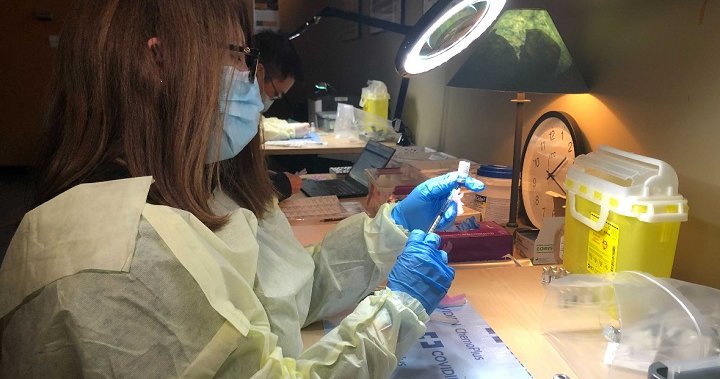People with allergic reaction to 1st COVID vaccine can ‘safely receive future doses’: NACI – National | Globalnews.ca
People who have had an allergic reaction immediately following their first dose of COVID-19 vaccine can safely get a second dose, according to the National Advisory Committee on Immunization (NACI).
Someone who experiences a “severe, immediate allergic reaction” after the first dose of an mRNA COVID-19 vaccine can safely receive future doses after consulting with an allergist or other physician, NACI said Friday. Such people should also be observed for 30 minutes after their second dose, rather than the usual 15 minutes.
“This means these individuals can receive the additional doses they need to complete their primary COVID-19 vaccine series and be better protected against COVID-19 as well,” Dr. Theresa Tam, chief public health officer of Canada, said Friday.
Read more:
Most past vaccine reactions don’t warrant exemptions to COVID-19 shots: experts
“Taking just a bit more care, this population can be safely vaccinated,” she said. “We hope this is good news for people who are worried about their allergic reactions.”
NACI said its evidence review showed that most people did not experience an anaphylactic reaction with the second dose, even if they had one with their first shot.

“Recent studies have shown that most people involved in those studies who experienced anaphylaxis after a first dose of an mRNA COVID-19 vaccine have been able to safely receive future doses of the same or another mRNA COVID-19 vaccine,” NACI wrote in its update on vaccine guidance. “In studies, the second dose was well tolerated with no or mild reactions.”
Tam noted however that a severe allergic reaction could still be a valid reason for a medical exemption from vaccination requirements, as each case must be assessed on a patient-by-patient basis with an allergist.
NACI’s update also included new recommendations on the spacing between doses of mRNA vaccine, saying that having eight weeks between doses was optimal.

Dr. Mariam Hanna noticed an uptick in requests for allergy assessments in her Burlington, Ont., clinic after the province began implementing COVID-19 vaccine certificates last month.
Whether people have held off on getting vaccinated because of a past reaction, or are seeking an exemption to inoculation mandates, Hanna said a previous allergic response doesn’t mean you can’t get your shots.
Allergists across the country have safely inoculated most patients who come into their clinics, regardless of allergy history, she said.
“Be it as an excuse or a misunderstanding or some miscommunication there, we are certainly getting a lot of referrals because of (vaccine rules),” said Hanna, an assistant clinical professor at McMaster University.
Read more:
How do you spot an adverse reaction following a COVID-19 vaccine? Experts explain
Some patients are concerned about receiving a second mRNA dose if they had an adverse reaction to the first. But she said many patients mistake common non-life-threatening reactions — including rash or swelling at the injection site — for an allergy.
“It’s only the very, very few patients that have had a systemic reaction, typically within 15 to 20 minutes of receiving the first dose, that we want to be careful about,” Hanna said. “Most of the side effects that we expect with a vaccine, those are not contraindications for exemption.
“And sometimes you need an allergist to help clarify it.”
The Canadian Society of Allergy and Clinical Immunology says the risk of systemic allergic reactions, including anaphylaxis, is extremely rare. Studies suggest the estimated annual rate of anaphylaxis in Canada is approximately 0.4 to 1.8 cases per one million doses of vaccines administered.
According to Health Canada’s review on adverse vaccine reactions, 307 cases of anaphylaxis have been reported in the country, out of more than 56 million COVID-19 doses administered.
–With files from the Canadian Press
View link »
© 2021 Global News, a division of Corus Entertainment Inc.
For all the latest health News Click Here


